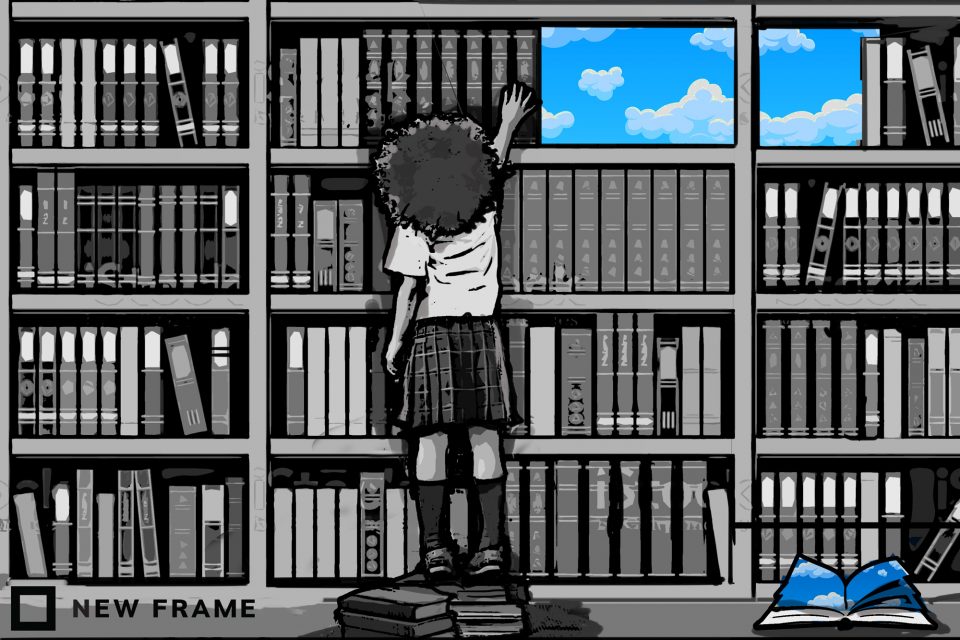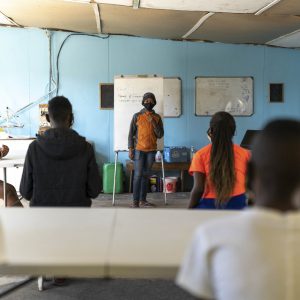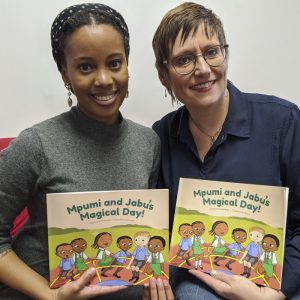The vital role of South Africa’s community libraries
As public spaces where people can learn, especially in impoverished rural areas, they are a precious resource. But budget cuts are limiting their number and what they can offer.
Author:
6 November 2020

“Because I was a rural child, I fully understand how it’s like growing up without access to books or a library,” says Ntokozo Ndlovu, a 35-year-old soldier, author and co-founder of a project to get books to as many rural children as possible.
Born in Impendle, KwaZulu-Natal, Ndlovu is a full-time member of the South African National Defence Force. The author of Matsimane and His People and a children’s book, Izethuso Neziluleko Zabazali Bami, describes himself as a “rural boy who is inspired by books”. His love for books and stories was instilled by his mother, who was a primary school teacher in the area. Stories feed Ndlovu’s imagination, which is why he would like to see as many rural children as possible with books in their hands.
With partners Njabulo Shange and Thembelani Ndlela, Ndlovu co-founded The Web Foundation, a non-governmental organisation (NGO) that is running a campaign to spread a love of books among rural pupils. Called Siyafunda Donate-a-Book, the project is driven by 20 members who work as volunteers at the foundation. These volunteers are selected based on the skills needed at a particular time and the values they add to the team.
Related article:
Ndlovu and his team have helped establish much-needed libraries in rural schools and donated books to community libraries. “Siyafunda Donate-a-Book, which is the education extension of our organisation, has thus far donated more than 375 000 books to the value of R2.2 million to 45 schools in seven provinces, and reached more than 18 000 children,” says Ndlovu.
The foundation has also set up e-libraries at Sehloi and Mokobola primary schools in Ga-Mabocha village in Limpopo, and at Mduna Primary School in KwaNongoma, KwaZulu-Natal.
“The Web is working towards getting children to read,” reads a statement by the foundation. “However, once children do learn to read, it’s critical to nurture that habit, so that they begin to enjoy it, and continue to read. To cultivate a reading habit, children need to have access to books and libraries with good books to read.”
#NoRuralChildLeftBehind
The foundation, now in its fifth year, works to ensure rural pupils have access to books, hence its social media hashtag #NoRuralChildLeftBehind. “We simply mean that we do not want any rural child to be left behind. We believe that all children deserve the same equal opportunities to better education,” Ndlovu says.
Ndlovu and his team believe that making books accessible will entrench a culture of reading and teach children the critical skill of reading with comprehension from an early age. “The reading of books is fundamental in the development of a child’s mind [and] also to inspire curiosity,” he says.
Related article:
The project is strictly aimed at no-fee schools in rural areas, and they must send in a request explaining their financial situation. “We have personnel in all the provinces and two main branches, Durban and Pretoria. We do not have financial donors, so we do not have the money to pay our volunteers.”
To raise funds, the Web Foundation sells second hand-books at Brooklyn Mall in Pretoria, and it also relies on donations from the public as well as benefactors. Ndlovu says the biggest need is for children’s books in African languages in the age group four to 15 years that can also be used in the classroom.
Places of knowledge
The importance of school libraries cannot be overstated. They are where knowledge resides. But Nazeem Hardy, president-elect of the Library and Information Association of South Africa (Liasa), says all is not well with the school library system.
“In recent times, we have seen the addition of media centres to schools which replaces the traditional library, but again when we are dealing with low levels of literacy and a lack of staff to teach information literacy. This erodes the function of that media centre. While some schools have libraries, very often this does not go hand in hand with a qualified school librarian. It is often the role of another teacher to stand in for a qualified librarian. School libraries are for the most also inadequately resourced.”
For this reason, Ndlovu and his team aim to provide resources to libraries in rural areas. The idea is “to build a state-of-the-art rural library that will provide information and ideas that are fundamental to functioning successfully in today’s information and knowledge-based society, enabling children to live as responsible citizens”, he says.
Lack of support for public libraries
Apart from school libraries, South Africa has many public libraries run by municipalities. In recent years, the money to keep them running has dwindled and some have closed, including a dozen recently in the Dr Beyers Naudé Local Municipality in the Eastern Cape.
“As long as libraries remain an unfunded mandate at a local government level, the issue of budget cuts will always remain a reality,” says Hardy, adding that these cuts mean libraries cannot buy new books and other learning materials and often go without them for long periods. It also means they cannot pay qualified staff.
“We have seen numerous examples where a matric [certificate] is the highest requirement for a librarian post, a position that requires a degreed individual,” says Hardy. “One can relate this [issue] to funding since if the necessary funding was available, posts would have been advertised at the correct level. This is not the only reason for the employment of unqualified staff, but it is an important factor.”
Liasa writes on its website that it “strives to unite, develop and empower all people in the library and information field into an organisation that provides dynamic leadership in transforming, developing and sustaining library and information services for all people in South Africa”.
Related article:
Adds Hardy: “It is written in our [country’s] Constitution that people will have access to information. Without community libraries, people do not have access to this basic right enshrined in our most important document in this country. It is easy to say that in the time of Google, why do we need libraries? Data is expensive in South Africa, and even from that perspective, the public and community library has become a precious resource in accessing free Wi-Fi.
“We have huge discrepancies in terms of literacy and numeracy in this country and that divide is growing every day, as shown by Covid-19 and its impact. Books are also expensive and are seen as a luxury if put against basic human needs. A community library becomes the potential equaliser by providing everyone access to information in various formats, and that is why they matter.”
The case for community libraries
For Hardy, community libraries are essential where schools have no libraries themselves. “A lack of school libraries has forced the public and community library to become the de facto school library as well.” They provide access to study materials, computers and Wi-Fi, and thus tuition, and are also spaces for studying and doing homework.
But children aside, libraries are as important for other members of the community. “One of the best ways to improve reading and literacy levels is to make reading material available to people,” says Hardy. “Books are an expensive commodity in South Africa, and community libraries become the gateway to providing access to these reading materials.
Related article:
“Most community libraries have outreach programmes where community members are engaged in literacy classes, reading programmes, craft sessions, information on various services, chess classes, and so on.”
He notes further that South Africa also needs to “encourage and foster the writing of books in indigenous languages and to foster representation in the reading materials that are available to readers”.
The Web Foundation envisages a society where both children and parents are literate, informed and enjoy books. He is pleased with the work he and his team have done so far. “In the past four years, more learners in poor and rural schools have had access to books and libraries compared to 2011. The work we are doing is not for ourselves. We have never initiated any project as some sort of legacy… We are called to serve the nation, more especially rural communities.”




